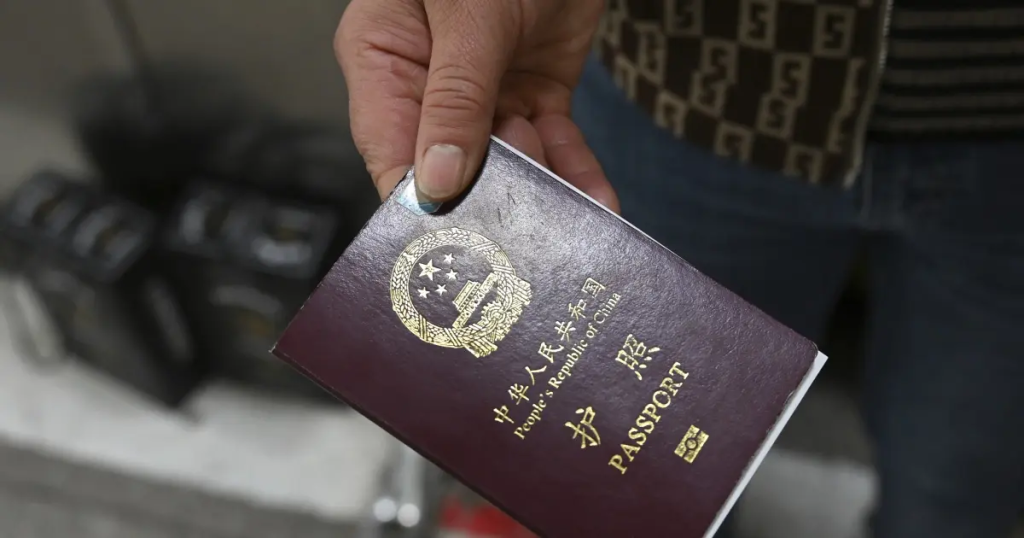
China’s passport ranking has plummeted to 115th globally, a stunning indictment of the Chinese Communist Party’s (CCP) foreign and domestic policies. For a country that claims to be rising as a global power, this decline is more than symbolic, it’s a reflection of how Beijing’s aggressive diplomacy, internal repression, and image management have backfired on its own citizens.
Despite the CCP’s propaganda portraying the Chinese passport as a badge of pride and global access, the reality is starkly different. Chinese travellers face increasing scrutiny, discrimination, and even humiliation at international borders. In Tanzania, for instance, a blogger documented how Chinese nationals were singled out for luggage checks and forced to pay bribes, while other travellers passed through unbothered. These experiences are not isolated. They are symptomatic of a growing global distrust toward Chinese travellers, fuelled by both individual misconduct and the broader reputation of the Chinese state.
Beijing’s “Wolf Warrior” diplomacy marked by belligerent rhetoric, coercive tactics, and nationalist bluster has alienated many countries. Instead of building trust, China has cultivated fear and resentment. The CCP’s habit of throwing billions at small nations to buy diplomatic recognition of its “One China” policy has not translated into respect for its citizens. On the contrary, it has created a perception of China as a transactional bully, willing to spend lavishly for symbolic wins while ignoring the real needs of its people.
This disconnect is painfully visible in the treatment of Chinese tourists abroad. Incidents of bribery, smuggling, and disrespectful behaviour such as the elderly man in Australia who tried to negotiate a customs fine after being caught with 15 kg of undeclared food, reinforce negative stereotypes. These behaviours, while not representative of all Chinese travellers, are amplified by the lack of accountability and civic education within China itself. When laws are seen as flexible and bribery as tradition, it’s no surprise that such attitudes spill over internationally.
China has 1.4 billion citizens, yet only around 200 million hold passports. Many of these individuals have never travelled abroad and are fed a steady diet of nationalist propaganda that glorifies the Chinese passport. But when they do travel, the gap between expectation and reality is jarring. In Hong Kong, for example, Chinese citizens require a special permit and receive shorter visa-free stays than Americans, Indians, or Russians. The irony is glaring Hong Kong is supposedly part of China, yet Chinese citizens face more restrictions than foreigners.
Even domestically, the passport can be revoked arbitrarily. One journalist recounted how her passport was cancelled by local authorities just before a trip to Qatar. The reason? “Too many overseas scams lately.” This paternalistic control reflects the CCP’s deep distrust of its own people and its obsession with surveillance. The result is a passport that not only lacks global respect but also fails to guarantee mobility within China’s own borders.
When Chinese citizens face trouble abroad, their embassies often fail to respond. One man stranded at a Malaysian airport after losing his passport received no help despite repeated calls. Another traveller scammed in Barus had $40,000 confiscated by local police. After sending 17 emails to the Chinese embassy, he received only a vague reply: “Please be patient.” These stories reveal a harsh truth, China’s so-called national strength does not extend to protecting its citizens overseas.
This failure is rooted in the CCP’s priorities. The government spends billions on foreign aid and military expansion but neglects basic consular services. Chinese citizens are treated as instruments of state power, not individuals with rights. When they are exploited or mistreated abroad, they are expected to endure silently. This passivity reinforces the stereotype of Chinese travellers as easy targets compliant, unassertive, and unwilling to challenge injustice.
The CCP’s narrative of national rejuvenation is seductive but hollow. Economic growth, military expansion, and diplomatic theatrics may impress on paper, but they do little to improve the lives of ordinary citizens. Rising living costs, unemployment, and domestic repression continue to plague China. Meanwhile, the aggressive posture abroad has led to increased visa restrictions, harsher immigration checks, and growing anti-China sentiment globally.
The most tragic irony is that the very people who are told they “stand tall” in the world are the ones most likely to be humiliated at foreign borders. The CCP’s obsession with control and image has created a system where superficial power is prioritized over genuine respect. When a country’s rise is built on censorship, coercion, and propaganda, it is the citizens who pay the price.
China’s passport crisis is not just about travel, it’s about trust, dignity, and the failure of governance. The CCP must confront the consequences of its policies. Lavish spending on diplomatic recognition, aggressive rhetoric, and domestic surveillance do not build global credibility. They isolate China and stigmatize its people.
If China truly wants to be respected internationally, it must start by respecting its own citizens. That means protecting their rights abroad, reforming domestic governance, and abandoning the illusion that power alone commands respect. Until then, the Chinese passport will remain what one traveller bitterly called “the most expensive luxury item” not because of its value, but because of the cost it imposes on those who carry it.
